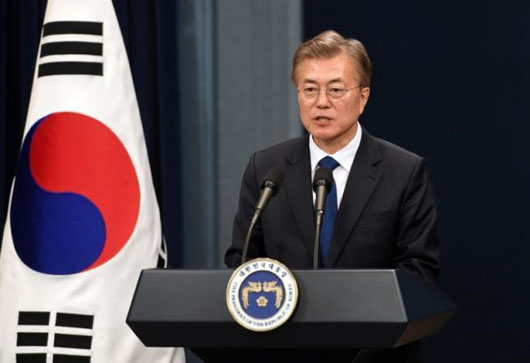by WorldTribune Staff, July 17, 2017
The government of South Korean President Moon Jae-In has made its first formal overture to North Korea, proposing direct military talks between Seoul and Pyongyang.
South Korea’s Defense Ministry proposed talks between representatives of the two countries’ militaries that would be held on July 21 at Tongil-gak on the North Korean side of Panmunjom, the so-called truce village in the DMZ.

The talks at Panmunjon would be aimed at ending “hostile acts” between the two, which “escalate military tension,” according to a statement from South Korean Deputy Defense Minister, Seo Joo-Seok.
North Korea did not immediately respond to the proposal.
South Korean Unification Minister Cho Myoung-Gyon also called for the restoration of military and government hotlines across the border, which had been cut by the North last year in response to the South imposing economic sanctions after a nuclear test by Pyongyang, Reuters reported on July 16.
The move by Moon’s government comes as the United States is preparing to introduce new sanctions at the UN against Pyongyang in response to the North’s successful ICBM test on July 4.
In a speech ahead of the G20 meeting in Hamburg, Moon described North Korea’s missile launch as “disappointing” and “reckless.”
“Because we have reached the tipping point of the vicious cycle of military escalation, and thus, the need for dialogue is more pressing than ever before,” he said.
North Korea’s Foreign Ministry last week said it would take “corresponding measures” if the UN Security Council imposes another sanctions resolution.
“The resounding success of the test-fire of the intercontinental ballistic rocket Hwasong-14 has fully demonstrated the will and capability of the DPRK to annihilate the US by a single blow to the very heart of its mainland in case it fails to act with discretion,” a spokesman for the ministry said in a statement published by state news agency KCNA.
“It is time for the US to renew its perspective on the DPRK’s strategic position which has reached the dazzling heights, and to act with prudence,” the statement said. “However, it is inviting its ultimate doom by resorting to the sanctions and pressure campaign against the DPRK.”
South Korea also proposed separate talks between Seoul and Pyongyang’s Red Cross organizations to resume a humanitarian project to reunite families separated during the 1950-53 Korean War.
The South Korean Red Cross suggested the talks be held on Aug. 1, with possible reunions over the Korean thanksgiving Chuseok holiday, which falls in October this year.
Meanwhile, the Trump administration said it could impose new sanctions on small Chinese banks and other firms doing business with Pyongyang within weeks, two senior U.S. officials said.
The U.S. measures would initially hit Chinese entities considered “low-hanging fruit,” including smaller financial institutions and “shell” companies linked to North Korea’s nuclear and missile programs, one of the officials told Reuters.
It would leave larger Chinese banks untouched for now, the official said.
The timing and scope of the U.S. action will depend heavily on how China responds to pressure for tougher steps against North Korea when U.S. and Chinese officials meet for a high-level economic dialogue in Washington on July 19, the administration sources told Reuters.
President Donald Trump and his top aides have signaled growing impatience with China over North Korea.
The targets under consideration for new sanctions would come from a list of firms numbering “substantially more than 10” that Trump shared with Chinese President Xi Jinping at a Florida summit in April and which U.S. experts have continued to compile for review, according to one of the officials.
The administration has yet to see what it considers a sufficient response from China.
“The president is losing patience with China,” one of the officials told Reuters, adding that there would be a “more aggressive approach to sanctioning Chinese entities … in the not-too-distant future.”
Letters to the Editor __ Subscribe to Geostrategy-Direct __ Support Free Press Foundation
